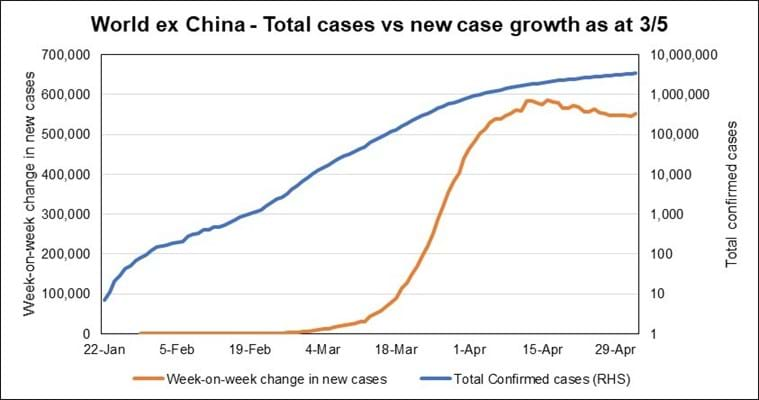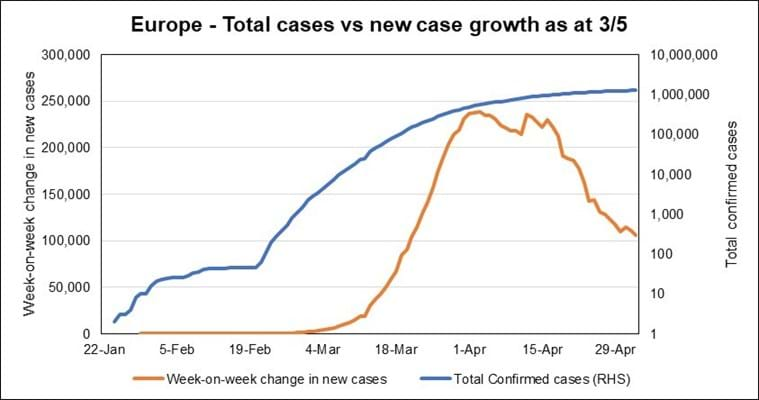Overcoming The Impact Of Coronavirus - An Economic Perspective
How is world faring against the Coronavirus?
Since COVID-19 was first detected in China, transmission across the rest of the world has been substantial, as have been the number of deaths. There have been over 3.5 million confirmed cases and over 247,000 deaths. However overall growth rates have slowed globally. This raises confidence that the worst is passing and has seen some countries start to relax their lockdown measures including Austria, New Zealand and here in Australia. This is to allow economies to “restart” and gradually get back to normal.
Source: CSSE at John Hopkins University
In Australia
- Infections have continued to slow with less than 900 active cases remaining, compared to over 6,800 cases we have experienced as of 3 May.
- Sadly, we have seen over 90 deaths with aged care residents and Ruby Princess passengers amongst the worst affected.
Government support in the form of the JobSeeker and JobKeeper programs should help workers and businesses weather this period more favourably compared to some other countries. For example, in the US there have been over 30 million workers file for unemployment claims since late-March.
How is the economy going now and in the future?
Coming out of lockdown is only the start of getting back to normal. Government stimulus will help support workers and businesses. It cannot however completely counter the job losses and business closures we have seen. It will take time for both the Australian and the global economy to recover.
Economic growth forecasts
Sources: IMF, FactSet
The above tables show forecasts for economic growth in 2020 and 2021. “FactSet Consensus” is an average of economist predictions while “IMF” refers to the International Monetary Fund, an organisation that helps monitor economies and markets and acts as an emergency lender.
We can see that this year is expected to be a tough one. All economies excluding China are seeing negative growth (a.k.a. a recession). However, on the positive side, assuming the virus outbreak continues to slow down, we should see some form of economic recovery next year.
One factor that might help sooner is progress on the medical front. For example, there are reports that Gilead (a major pharmaceutical company) drug “remdesivir” has shown promising signs of helping infected people recover more quickly. Treatments like this or a vaccine would help substantially in the recovery effort as well as reducing the risk of a “second wave” of infections from relaxing restrictions.
What does this mean for your investments?
At the time of writing:
- Markets have rallied substantially from their lows on 23 March
- The Australian share market is up 21.5% from 23 March to 30 April this year
- International shares in AUD terms have risen 12.9% over the same period
- The Australian dollar also recovered by 13.8% to USD 0.6547.
Arguably investors are pricing in a faster economic recovery on the back of sizeable government stimulus and interest rate cuts. In addition, not all businesses have been hurt. Some have gained strength and seen an increase in demand for products like Netflix and YouTube.
Going forward, it will be difficult to anticipate how markets develop from here. We would suggest a cautious approach remains prudent for the months and years ahead as we will see substantial challenges for the global economy.
In addition, we anticipate:
- The RBA has signalled only a very gradual unwinding of its policy stance to keep rates low until the economy has materially recovered. This means returns on term deposits and savings accounts are likely to remain weak for the next few years and similarly for bonds.
- Dividends to remain under pressure even as the economy recovers. Shutdowns have seen some businesses lose customers and have to raise capital to survive. It took dividends five years to recover to their previous highs after the financial crisis as an example of what can happen.
-
Equity markets remaining volatile until we see a clearer path to unwinding lockdowns globally. There are still material risks in countries with poorer healthcare infrastructure to suffer sizeable outbreaks as in fact some are already experiencing.
Importantly though, we believe that in time, our economy and the world will recover. Maintaining your plan even in this latest period has helped. Going to cash early would have meant missing the rally we have seen in April. It is one example for why you should maintain the course regarding long term investing.
General Advice Disclaimer: The information in this report is general advice only and does not take into account the financial circumstances, needs and objectives of any particular investor. Before acting on the general advice contained in this report, an investor should assess their own circumstances or seek advice from a financial adviser. Where applicable, the investor should obtain and consider a copy of the prospectus or other disclosure material relevant to the financial product before making any investment decision to acquire a financial product. It is important to note that the price or value of financial products go up and down and past performance is not an indicator of future performance.




